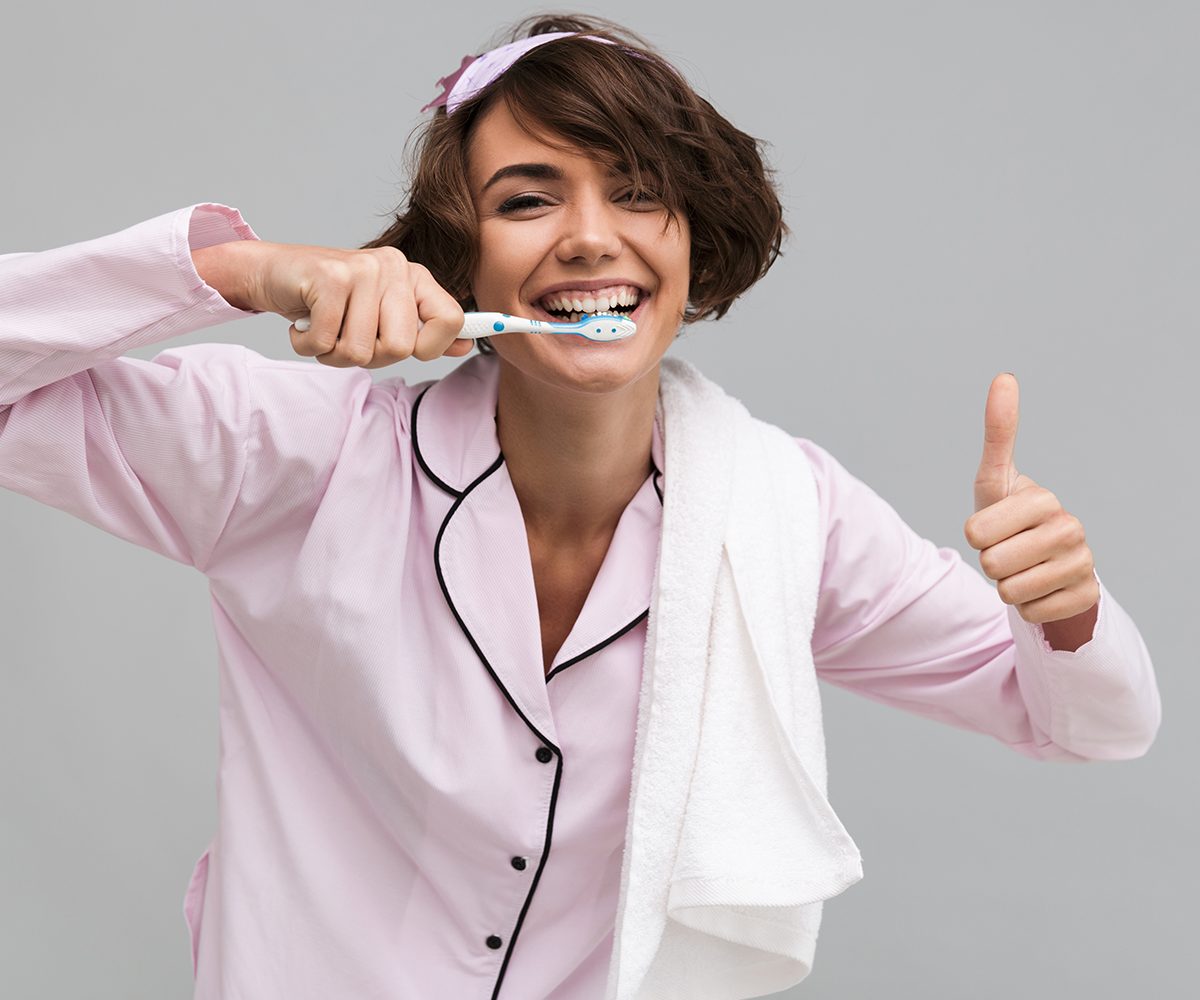Now that you can’t visit a professional for oral hygiene, it is up to you to make sure that your teeth, tongue, and gums get the best possible self-care. We have compiled a list of five important at-home oral healthcare tips for you and your loved ones to follow for optimal oral health in quarantine:
Clean your toothbrush
First and foremost, it is important that you wash your hands with soap before and after touching your toothbrush, to avoid potentially spreading anything to or from your mouth. Be sure to rinse your toothbrush before and after every use by holding it under hot water. This will soften the bristles and release any food particles or hardened toothpaste from the last use. Some other ways you can disinfect your toothbrush at home include soaking it in antibacterial mouthwash, soaking it in 1 cup of water mixed with 2 teaspoons of baking soda, and soaking it in a cup of water with a denture cleaner tablet. These methods will effectively and safely disinfect your toothbrush to prevent the spread of germs.
Follow the ‘2×2 Rule’
Brush your teeth for two minutes, twice a day with a clean, soft-bristled toothbrush. If you are using a manual toothbrush, be sure to hold it at a 45° angle to your gums and brush gently in a circular motion. And if you are using an electric toothbrush, gently brush in a gliding motion, tooth-by-tooth. To get the kids excited, schedule ‘brushing parties’ to make this essential part of you and your family’s daily routine more enjoyable.
Stick to your routine
Your normal daily routine may have completely gone out the window, but it doesn’t mean your oral health routine needs to change. Just because you aren’t leaving your house, doesn’t mean that you don’t have to brush your teeth in the morning! It’s now more important than ever to stick to your daily regimen. Along with brushing, it’s also important to keep flossing. Flossing in-between your teeth with dental floss is an often overlooked yet necessary oral health practice. Even though you brush your teeth (twice a day), debris and plaque collect between them. Interdental cleaning helps cleanse hard-to-reach areas of bacteria or food particles that your toothbrush may leave behind. Flossing also helps reduce your risk of developing gum disease, periodontal disease and heart disease. Add two minutes to your daily oral healthcare regimen and floss for a cleaner, healthier you!
Limit acidic drinks and sugary foods
Did you know that sugary snacks aren’t the only thing that can harm your smile? Foods and drinks that are high in acid can also have a negative impact on your oral health. Acids wear away the enamel that protects your teeth, and over time when your enamel is weakened or destroyed, cavities form. This process is called ‘tooth erosion’ and can cause severe permanent damage to your smile. Some ways to protect your teeth at home include: limiting your consumption of sugary, acidic beverages and foods, rinsing your mouth with water after drinking soft drinks, teas, coffees and juices, as well as brushing and flossing your teeth after snacking on sugary treats. Chips and popcorn that get stuck in-between your teeth expose them to sugars and acids that develop plaque, erode enamel, and cause cavities. This doesn’t mean you cannot treat yourself; just be mindful of how you are treating your oral and overall health.
Know when to change your toothbrush
It is recommended that you change your toothbrush or electric toothbrush head every three months to ensure you are cleaning your teeth with fresh, soft-bristled brush. Bent, frayed bristles cannot clean your teeth effectively, and often hold onto bacteria that can jeopardize your oral health. If you or a loved one gets sick, we recommend that you safely dispose of the old toothbrush to avoid the spread of germs and potentially compromise other peoples’ overall health, especially during this COVID-19 pandemic.
Taking care of your oral and overall health has never been more critical. As we stay home and distance ourselves to combat the spread of COVID-19, let’s also remember to continue fighting plaque, cavities, and tooth decay.

